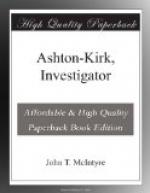It wanted a few minutes of three o’clock when Ashton-Kirk, still accompanied by the curious Pendleton, walked into the outer room of the coroner’s suite.
“Mr. Stillman will be here at any moment now,” said Curran. Then lowering his voice and making a short little gesture from the elbow, he added: “These people are the ones he wanted to see.”
As he and Pendleton sat down, Ashton-Kirk looked at the persons referred to. The first was a thin, wiry little woman, unmistakably Irish, cleanly dressed and with sharp, inquisitive eyes. Engaged in a low-pitched conversation with her was a thick-necked German, heavy of paunch and with a fat, red face. The third was a spectacled young Jew, poring over a huge volume which he seemed to have brought with him. He had a tremendous head of curling black hair; his clothing was shabby. There was a rapt expression upon his face; plainly nothing existed for him at that moment outside the pages of his book.
After a brief space, the coroner came in,
“Ah, how do you do, gentlemen,” greeted he. He was good-natured and strove to be easy; but his natural nervousness clung to him. “I am glad to see you.”
He looked at Curran and nodded at the three inquiringly.
“Yes, sir,” replied the clerk; “these are the parties.”
“Then we will get down to business.” He opened a door and entered an inner room. “Will you come in?” he asked of Ashton-Kirk and Pendleton.
They followed him at once; and Curran, addressing the little Irishwoman, said:
“Now, Mrs. Dwyer, this way, please.”
She arose briskly and also entered the inner room. Stillman seated himself at a desk and carefully perched his glasses upon his nose.
“I perhaps take more trouble than is customary in these cases,” he said to Ashton-Kirk. “It is usual to hear statements, I believe, only when they are proffered as testimony at the inquest. But it seems to me that the office should be carried on in a more thorough way. Preparation, I think, is necessary to get at the facts.”
Then he faced the woman who had taken a chair beside the desk.
“Your full name, please,” said he.
“Honora Dwyer. I’m a widow with four children; I live at 71 Cormant Street, an’ me husban’ has been dead these three years,” declared she, in a breath.
Stillman smiled.
“You don’t believe in keeping anything back, Mrs. Dwyer, I can see that,” said he. “And a very good trait it is.” He leaned back in his swivel chair and looked at her through the glasses. “You are the person who discovered the body of Mr. Hume, are you not?”
“Yes, sir, I were,” replied Mrs. Dwyer; “and God spare me such another sight.”
“Tell us about it,” said the coroner.
“I work as scrub woman for a good many in Christie Place an’ the immejeat neighborhood,” said Mrs. Dwyer, genteelly. “But I always gets to Mr. Hume’s first.”




